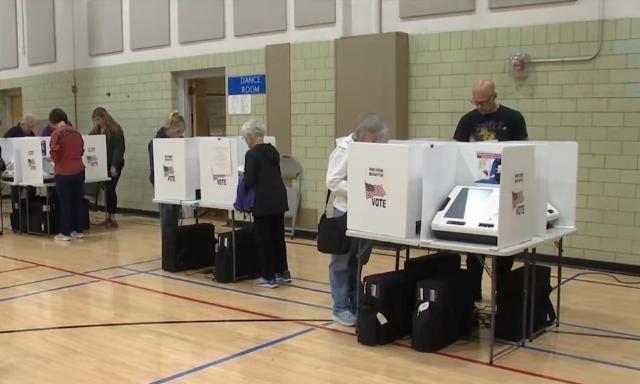Anyone with a brain knows that there was epic cheating behind Biden’s “win” in 2020, ranging from official cheating (e.g., mail-in ballots, drop boxes, and ballot harvesting) to unofficial cheating (e.g., delayed vote counts, faked ballots, and illegal registrations). Pollster Scott Rasmussen has discovered something very disturbing about all that cheating: While ordinary Americans want fair elections, the “elite”—that is, the rich, powerful, and connected—don’t. They want only to win.
According to the Issues and Insights editorial board:
Earlier this year, pollster Scott Rasmussen asked voters a simple question: “Would you rather have your candidate win by cheating or lose by playing fair?”
The answers he got back were, as he put it in a Daily Signal podcast last week, “the most terrifying poll result I’ve ever seen.”
Among all Americans, just 7% said they would want their candidate to win by cheating. As Rasmussen put it, he’d rather see that number lower, but that’s not bad.
But more than a third of the elite 1% he surveyed would condone cheating. And among those who are “politically obsessed” – meaning that they talk about politics every day – that number shot up to 69%.
The same editorial notes that this 1% of “elites” is almost entirely Democrat. Credentialed people (i.e., college and university graduates) are more likely to be Democrats, as are the wealthy. These are the people who control the levers of power in society, so the fact that almost 70% of those who are most concerned with politics think cheating is a fine way to win is a terrifying thought.
And what do these powerful sociopaths intend to do with the power they attain through cheating? Nothing good:
- Nearly 60% say there is too much individual freedom in America – double the rate of all Americans.
- More than two-thirds (67%) favor rationing of energy and food to combat the threat of “climate change.”
- Nearly three-quarters (70%) of the elites trust the government to “do the right thing most of the time.”
- More than two-thirds (67%) say teachers and other educational professionals should decide what children are taught rather than letting parents decide.
Reading about these self-styled “elites,” their goals, and their absence of morals reminded me inexorably of Alexis de Tocqueville. I have nothing more profound to add to this essay, and leave the last words to him:
“Democracy extends the sphere of individual freedom, socialism restricts it. Democracy attaches all possible value to each man; socialism makes each man a mere agent, a mere number. Democracy and socialism have nothing in common but one word: equality. But notice the difference: while democracy seeks equality in liberty, socialism seeks equality in restraint and servitude.”
“Despotism often presents itself as the repairer of all the ills suffered, the support of just rights, defender of the oppressed, and founder of order.”
“Even despots accept the excellence of liberty. The simple truth is that they wish to keep it for themselves and promote the idea that no one else is at all worthy of it. Thus, our opinion of liberty does not reveal our differences but the relative value which we place on our fellow man. We can state with conviction, therefore, that a man's support for absolute government is in direct proportion to the contempt he feels for his country.”
“When the taste for physical gratifications among them has grown more rapidly than their education…the time will come when men are carried away and lose all self-restraint… It is not necessary to do violence to such a people in order to strip them of the rights they enjoy; they themselves willingly loosen their hold…they neglect their chief business which is to remain their own masters.”
“The best laws cannot make a constitution work in spite of morals; morals can turn the worst laws to advantage. That is a commonplace truth, but one to which my studies are always bringing me back. It is the central point in my conception. I see it at the end of all my reflections.”
“It's not an endlessly expanding list of rights — the 'right' to education, the 'right' to health care, the 'right' to food and housing. That's not freedom, that's dependency. Those aren't rights, those are the rations of slavery — hay and a barn for human cattle.”
“They (the emperors) frequently abused their power arbitrarily to deprive their subjects of property or of life: their tyranny was extremely onerous to the few, but it did not reach the greater number; … But it would seem that if despotism were to be established amongst the democratic nations of our days it might assume a different character; it would be more extensive and more mild, it would degrade men without tormenting them.”
(As a quick aside, when I was at UC Berkeley in the very early 1980s, I was deeply impressed by de Tocqueville’s Democracy in America, so much so that I commented to my American history professor that I thought it was very profound and insightful. He looked horrified and hastened to tell me that de Tocqueville died in an insane asylum. His point was that you can’t trust a crazy man. In fact, de Tocqueville died from tuberculosis.)

https://www.americanthinker.com/blog/2024/04/if_you_believe_that_sociopaths_are_in_charge_you_re_right.html
https://www.americanthinker.com/blog/2024/04/usps_going_off_the_rails_in_georgia.html

No comments:
Post a Comment